Intel’s 8th-generation Core CPUs solve a problem for the superlight (sub-three-pound) laptops that are becoming increasingly popular. Up to now, these laptops could handle only dual-core CPUs, because quad-core CPUs created more heat than their slimmer profiles could manage.
That’s all changing with Intel’s ground breaking 8th-gen mobile CPU. Quad-cores once confined only to much larger and heavier laptops can now be stuffed into a tiny laptop, or so the company claims.
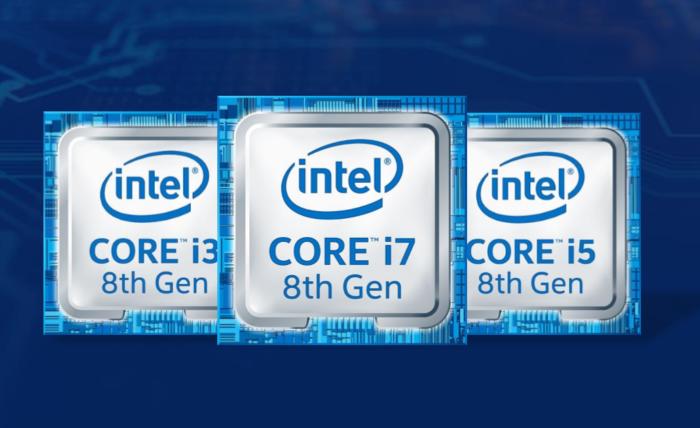 Intel
IntelBut can the 8th-gen CPUs actually give you the performance you expect and you’re paying for? Or this is this just a cynical attempt to sell you on some quasi-“quad-core” for you next laptop?
To find out, read on.
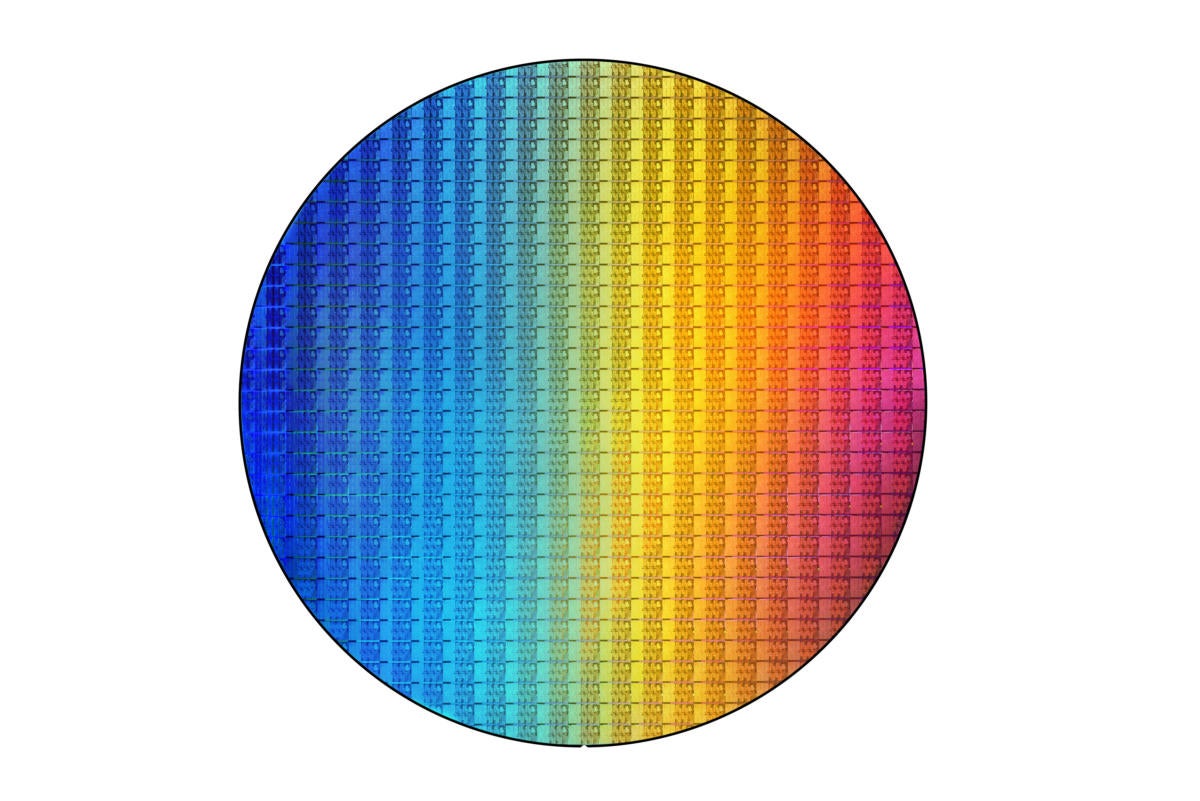 Intel
IntelIntel’s 8th-gen Core i7 promises to bring quad-core performance to ultra-portable laptops.
Laptop CPU reviews aren’t easy: How we did it
Unlike desktop CPUs, laptop CPU performance has always been a tricky task, as isolating the CPU is nigh impossible. Different laptop manufacturers will set the CPU to run at different speeds based on how much cooling they stuff into it, or how loud they want the fans to run at.
Basically, trying to compare an 8th-gen Dell XPS 13 to a 7th-gen Acer or HP introduces so many variables out of your control that it can be difficult to render a final decision.
Mentioned in this article
XPS 13 (2017, 8th-gen Core CPU)
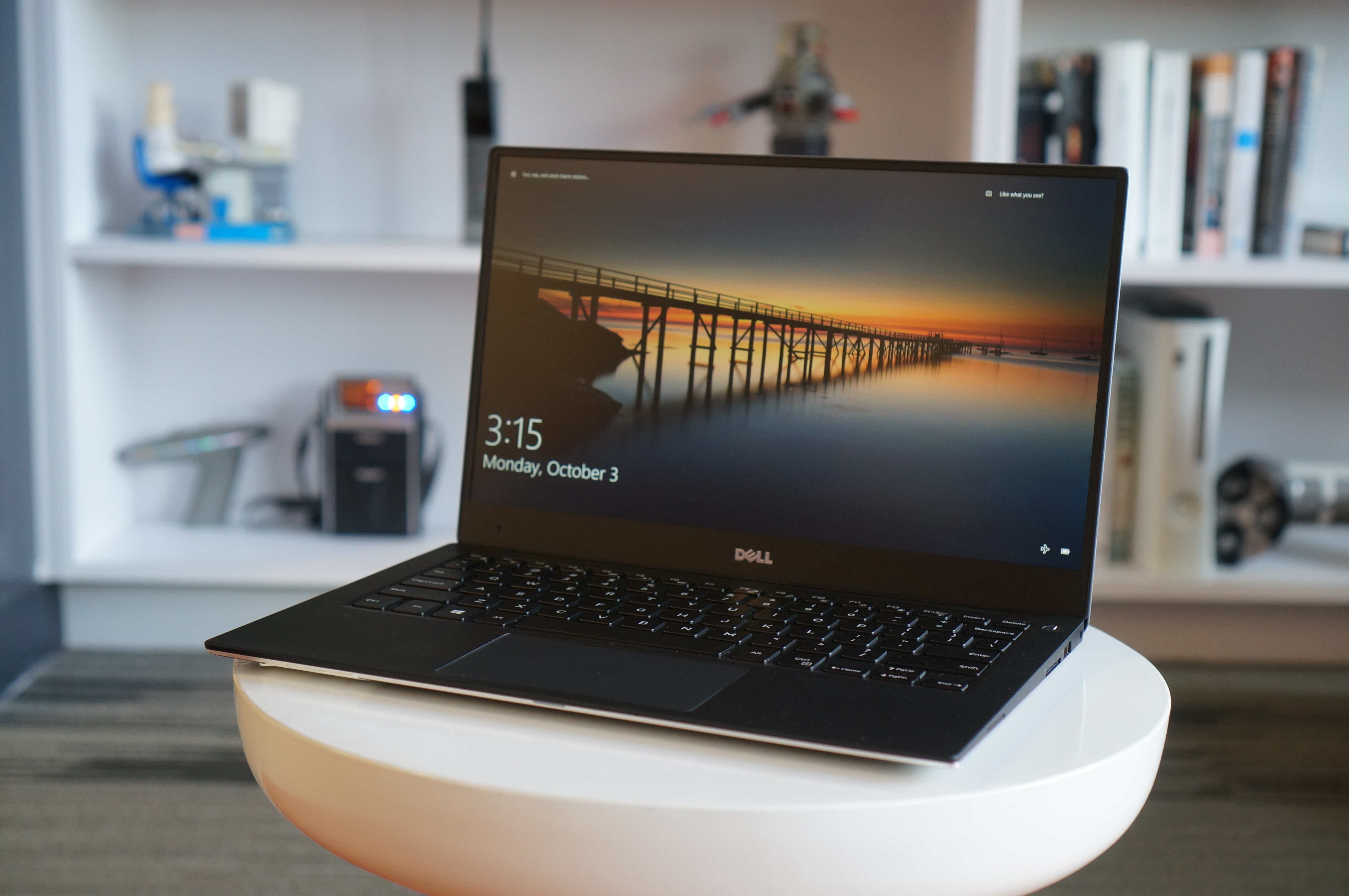 Read our reviewPrice When Reviewed:$1199.99Best Prices Today:$1199.99 at Dell
Read our reviewPrice When Reviewed:$1199.99Best Prices Today:$1199.99 at Dell
There is one way to get you closer, though: Compare the same laptop models made by the same manufacturer.
That’s exactly what we did this time, using Dell’s newest XPS 13 with a Core i7-8550U inside ($1,300 and up on Dell.com). To this, we compared a Dell XPS 13 with a 7th gen Core i7-7500U. For context we also lumped in the original Broadwell-based XPS 13 from 2015. Although outfitted with “only” a Core i5, we included it because it was also the model that first ushered in the zero-bezel “Infinity bezel” design.
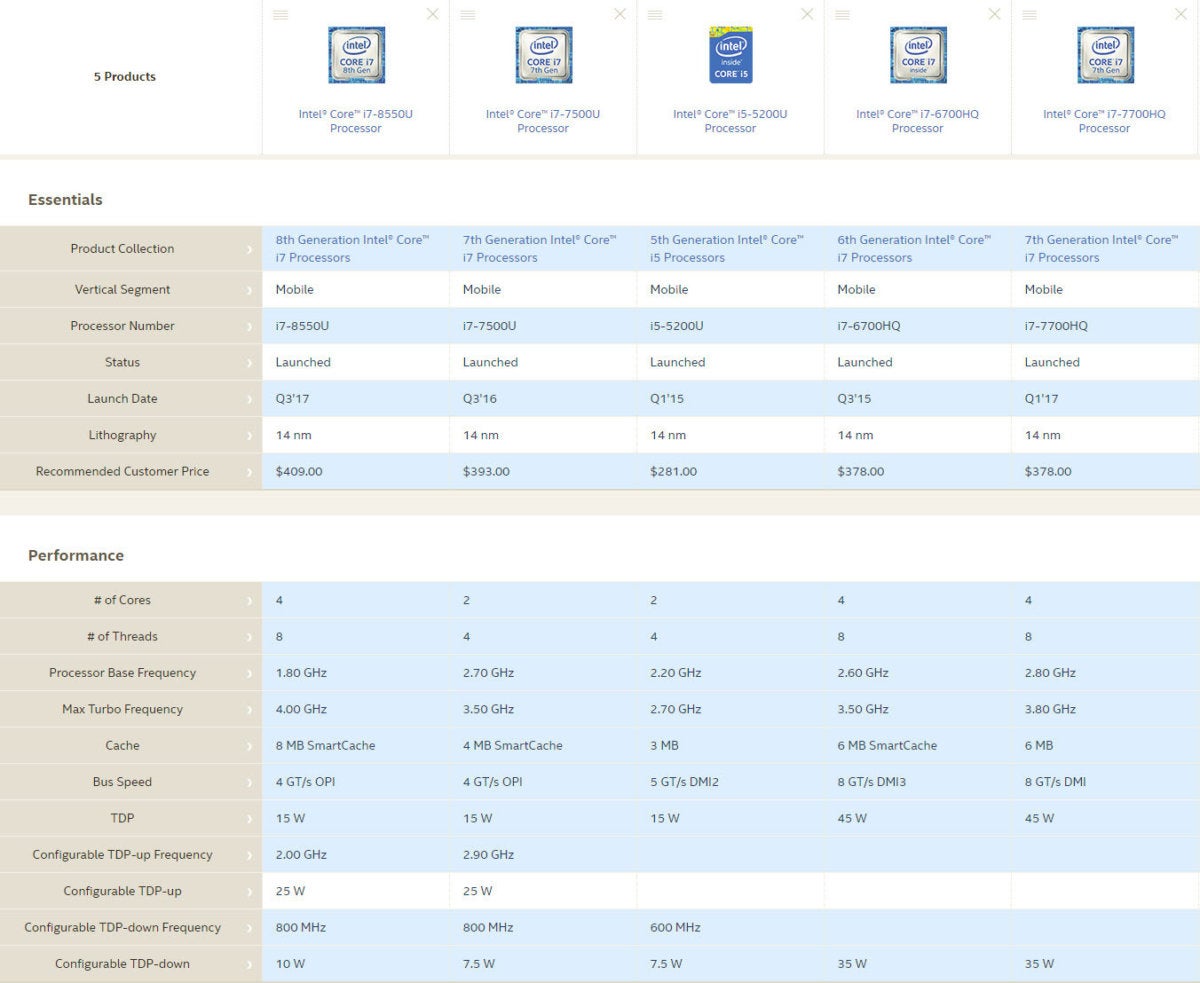 Intel
IntelThe laptops we’re comparing feature these CPUs in them.
And because we all want to know how the 8th gen hangs with “real” quad-core CPUs, we also include two Dell XPS 15 models with much more powerful quad-core CPUs and GPUs inside. That’s right, we’re pitting smaller, lighter laptops with lower-power 15-watt TDP CPUs against large laptops with 45-watt TDP CPUs, but they’re all quad-core. Let’s see what happens.
One last important important point we’ll make: All of the laptops here were updated with the latest version of Windows 10 available to them, as well the latest drivers and BIOSes. This is actually a very critical step for trying to dive into direct CPU comparisons, because drivers and BIOS versions can have huge impacts on performance. A laptop can launch and six months later, the OEM could decide to increase or decrease the performance based on customer complaints about temperature, fan noise or performance.
With that said, only the XPS 13 laptops had Windows 10 Fall Creators Update installed. Microsoft, it appears, did not deem the XPS 15s worthy.
Cinebench R15 Performance
Our first test is Cinebench R15. It’s a popular test built by Maxon and is based on the engine that runs its professional Cinema4D 3D rendering engine. The test concentrates on the CPU and is heavily multi-threaded.
The results speak for themselves. Anyone who thought Intel couldn’t pull off a quad-core in a 2.5-pound laptop has to eat their wordss as the Core i7-8550U simply destroys the 7th-gen Core i7 dual-core CPU, and for the most part hangs surprisingly well with the much hotter 45-watt quad-core chips in the two XPS 15 laptops.
What does this mean? It simply means, dayum: Intel’s new 8th gen is fast.
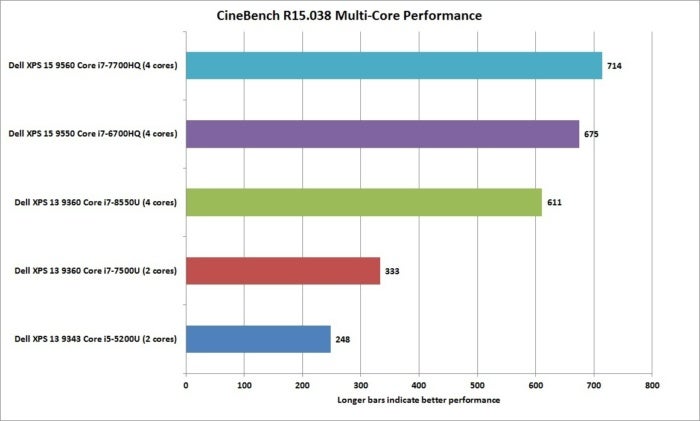 IDG
IDGDayum: Look at that 8th-gen quad-core CPU hanging so close to its beefier 7th-gen predecessor.
Cinebench R15 also allows us to test performance of the application in single-threaded tasks, so we threw the switch and ran all five laptops through the same task. The real surprise is the winner. You’d think it would be the Core i7-7700HQ in the newest XPS 15, but no, it’s the new Core i7-8550U in the XPS 13.
Okay, what’s really going on here? Well, if you look at the detailed specs in the Intel ARK chart (or click this to see them) you can see that the new Core i7-8550U has a higher turbo boost speed of 4GHz, compared to the 3.8GHz boost speed of the Core i7-7700HQ. Cinebench R15 clearly shows that boost speed can pay off. Given that the vast majority of applications people use rely far more on single-threaded performance than multi-threaded performance, this result is more important than it might seem.
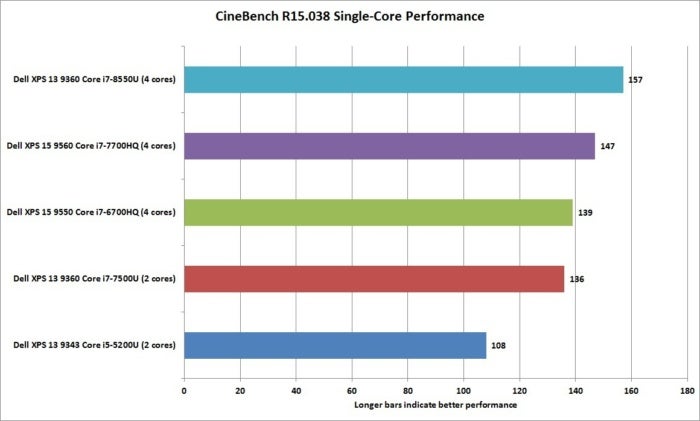 IDG
IDGThe higher 4GHz boost clock of the new 8th gen Core i7 gives it a leg up over the 7th-gen CPUs.
POV-Ray Performance
Next we ran POV-Ray, a ray-tracing application that literally dates back to the days of the Commodore Amiga. It’s been updated and moved to x86, of course, and it’s still a valid performance benchmark. Like Cinebench, it focuses on the CPU. We again see the 8th-gen quad-core Core i7-8550U easily blowing away the older 7th-gen dual-core and hanging with the much hotter 45-watt quad-cores.
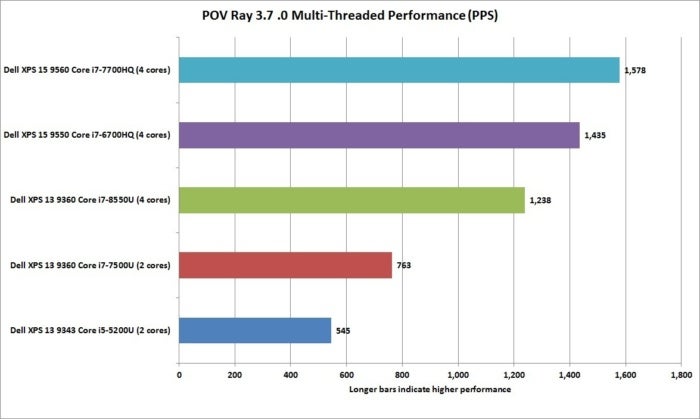 IDG
IDGThe 8th-gen quad-core Core CPU sticks close to 7th-gen quad-cores in POV-Ray multithreaded tests.
Like Cinebench, the POV benchmark can use a single compute thread. The result places the new 8th-gen Core i7-8550U in a good place, just behind the Core i7-7700HQ in the XPS 15. Note how the 6th-gen quad-core Core i7-6700K actually falls in line just behind the dual-core Core i7-7500U. Because both CPUs have the same boost clock of 3.5GHz, we’re not surprised. This is, again, a very good showing for the new 8th-gen Core i7-8550U chip.
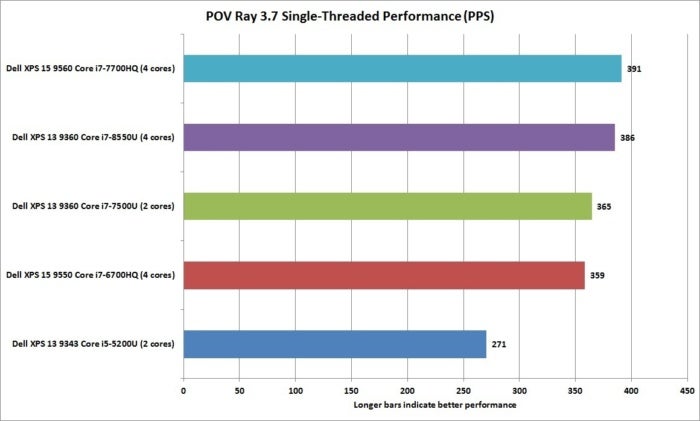 IDG
IDGThe 8th-gen Core CPU did well in single-threaded POV-Ray as well.
Geekbench 4 Performance
While both POV Ray and Cinebench hone in on CPU performance while rendering or ray tracing, Geekbench 4 tends to be a little more general and relies on a large list of algorithms that its maker, Primate Labs, considers relevant to processor performance. While Geekbench has been controversial at times, it’s mostly only when enthusiasts try to point to it as proof that a tablet chip is as fast or faster than a desktop chip. We won’t rehash all of that, but we will say the test is far more relevant when it’s kept on the same CPU microarchitecture. That is, of course, what we do here, as we stick solely to testing XPS 13 and XPS 15 laptops.
The results in Geekbench’s multi-core test speak well for the 8th gen Core i7-8550U. It runs dead even with the 6th-gen quad-core Skylake chip. And yes, it simply leaves the dual-core chips in the dust.
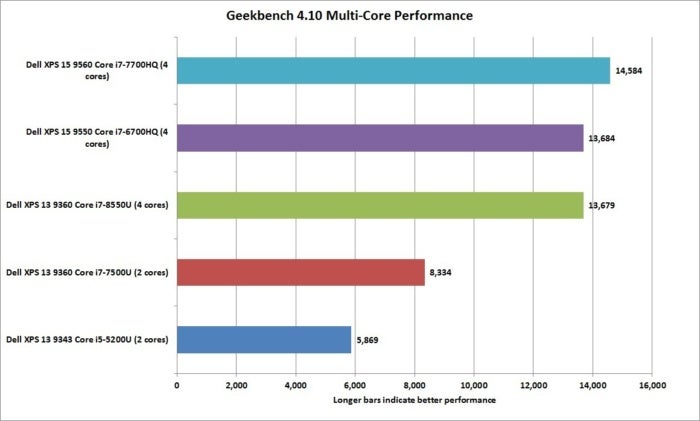 IDG
IDGGeekbench 4 uses various modern-day algorithms to try to suss out the performance a CPU.
Moving on to Geekbench’s single-core performance test, we again see the spunky XPS 13 hanging with the XPS 15. For the most part, the test puts all of the Core i7 CPUs in the same neighborhood. We’d tend to agree with that assessment, too because you’d be hard-pressed to tell the difference between a 7th-gen Core i7 and an 8th-gen Core i7 when using, say, Outlook.
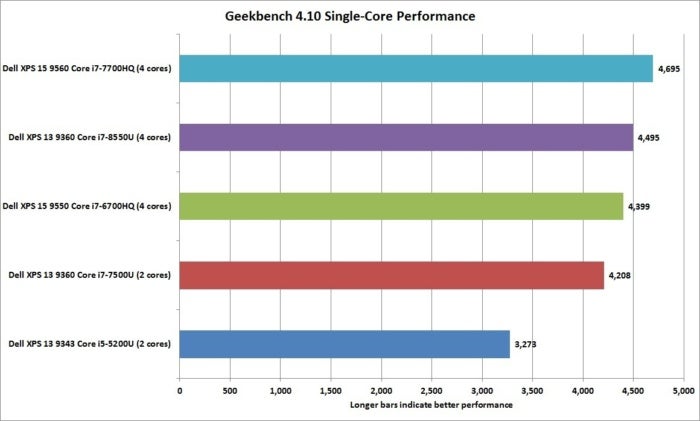 IDG
IDGThe single-core performance actually places all of the Core i7 CPUs in a the same neighborhood.
7-Zip Performance
As another sanity check on the performance results we saw from the previous tests, we also ran the internal benchmark for 7-Zip, a free file compression utility. (If you’re still using Window’s build in compression/decompression utility, go download 7-Zip now. It’s much, much faster.)
The results from this real-world application pretty much mirrors what we’ve seen already: a complete dusting of the 7th-gen Core i7 by the 8th-gen Core i7.
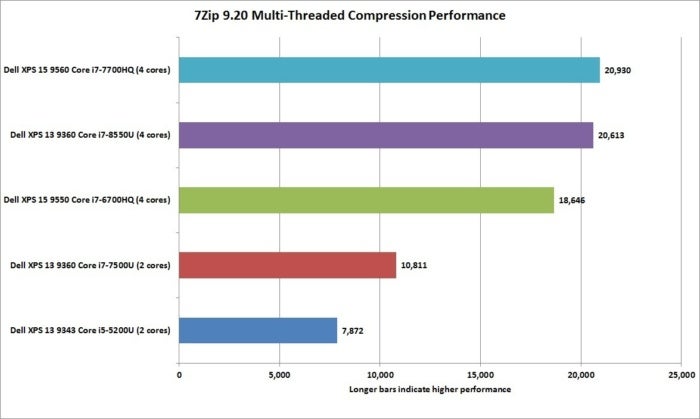 IDG
IDG7-Zip’s internal benchmark confirms what we’ve already seen: 8th-gen Core i7 smokes 7th-gen Core i7.
7-Zip also allows for a single-threaded or single-core test. The results again mirror single-threaded scores from other benchmarks.
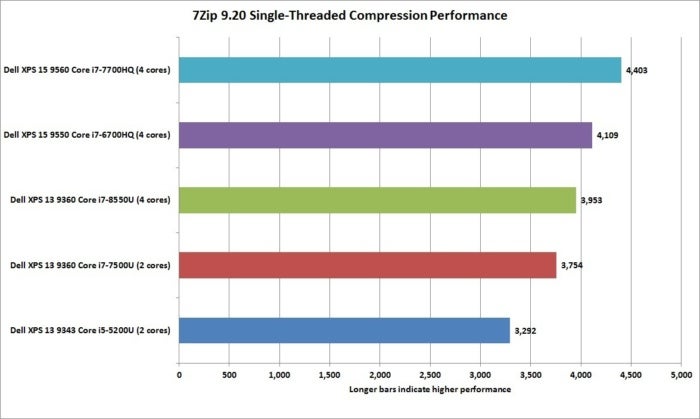 IDG
IDGSingle-threaded performance of the modern Core i7 and pretty close.
VeraCrypt Performance
We tried another internal benchmark, this one from the VeraCrypt free encryption program that’s a fork of the departed TrueCrypt. For the most part, both of the XPS 15s are dead even. No surprise, the 8th-gen Core i7 is just a step back from those quad-core laptops. And yes, dual-core, call us up when you cross the finish line.
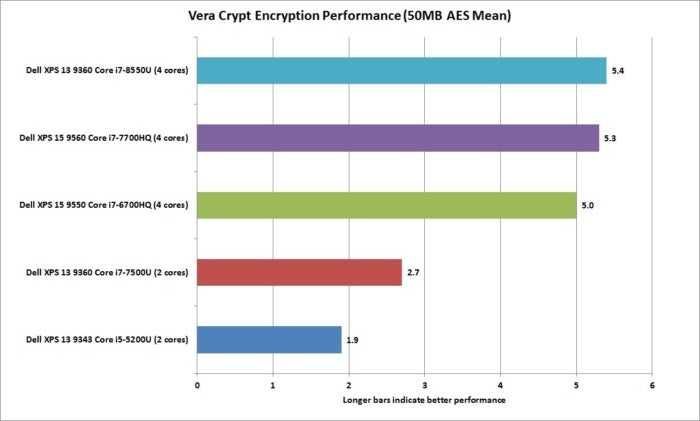 IDG
IDGIn yet another test, the 8th-gen Core keeps up with its 7th-gen predecessors.
Handbrake Performance
Although the performance of the 8th-gen Core i7-8550U looks downright spectacular, one thing we wanted to know is whether it could hold its performance on workloads that didn’t last 5 seconds or 50 seconds. Laptop CPUs are especially sensitive to thermal limitations, and long workloads generally means less performance.
Our Handbrake test is thus perfectly suited to see what kind of performance you can expect on a very long task. On a dual-core, it can take an hour and a half to complete, for example. On very challenged laptops, we often see pretty large hits to performance as it heats up.
The results here are, frankly, impressive. We say that because the Core i7-8550U has a processor base frequency of 1.8GHz. That’s basically the minimum clock speed the CPU would run at under the worst-case scenario, and certainly something we thought it would hit with a long workload.
Instead, the 8th-gen Core i7-8550U inside the XPS 13 again surprises us by destroying the 7th-gen dual-core Core i7-7500U. For the most part, it hangs with the quad-core XPS 15 laptops, though having a larger, beefier laptop with a much larger cooling system remains an advantage. Still, for the size of the XPS 13, its performance in Handbrake is very, very respectable.
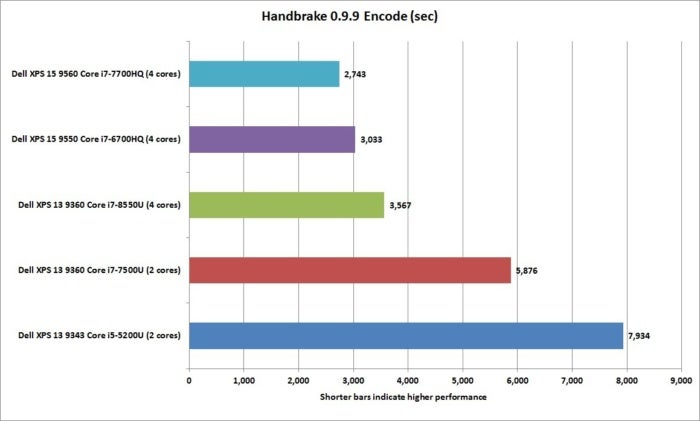 IDG
IDGDespite its TDP of 15 watts, the 8th gen CPU in the XPS 13 hangs much closer to the XPS 15 than we expected.
But how does it do with games? Find out on the next page.
Gaming Performance: Same old, same old
The 8th-gen Core i7-8550U’s gaming performance is nothing to write home about. And it shouldn’t be, as it’s very much the same graphics core as the previous chip. We ran 3DMark’s Skydiver 1.0 test and then focused on the graphics performance results. This ignores the extra x86 cores it has, so consider it a pure test of the graphics subsystem.
The 8th-gen chip’s UHD 620 graphics core come out slightly ahead of the 7th-gen’s HD 620 graphics core, but for the most part they’re pretty close. Intel basic IGP is adequate for entry-level or low-ambition gaming. Don’t expect much more without stepping up to an Iris Plus-based CPU or discrete graphics chip.
 IDG
IDGThe 8th gen XPS 13 graphics performance is slightly faster than a 7th gen XPS 13’s.
Battery Performance
The battery life results are a lot more difficult to interpret. Keep in mind that our battery rundown test is not a CPU test. It’s a video rundown test. We charge the laptop’s battery to full, then unplug it and run a 4K movie (the open-source Tears of Steel) repeatedly until the laptop dies. The laptop’s brightness is set to 250-260 nits, audio is on, earbuds are used, and airplane mode is engaged. The video, for the most part, runs entirely within the media engine of the CPU, so whether it has four cores or two cores shouldn’t matter that much.
Although the last few generations of XPS 13s look the same on the outside, internal differences in screen resolution, touch support, and other components can play a huge part in the results. For example, the 8th-gen XPS 13 has a 1920×1080 non-touch screen, while the 7th-gen XPS has a 4K 3840×2160 panel with touch. Higher-resolution screens tend to suck a lot of power.
Still, there is something to be gleaned from the results. For kicks, we also found a 7th-generation Core i7-7200U with a similar-resolution screen to the current 8th-gen model we’re testing. The results are pretty promising: While the 7th-generation XPS 13 with the same resolution screen gives us about 11 hours of battery life, the 8th-gen laptop finishes at about 12 hours, second only to the much older Broadwell XPS 13.
If you’re wondering why the Broadwell-based XPS 13 does so we well despite having a smaller battery our guess is the amount of RAM and the SSD, as well as any differences from the CPU and motherboard. That particular XPS 13 has only 4GB of RAM instead of the 8GB the 8th-gen and 7th-gen XPS 13 models have. System RAM does eat power, so having double the amount of RAM could be a drag on battery. We also suspect the SATA-based M.2 SSD and its rated active power consumption of 190 milliwatts, vs. the 4-watt power consumption of the Toshiba XG5 NVMe SSD in the 8th-gen XPS 13, make a difference.
And if you’re wondering how much of a hit you take from a higher-resolution, touch screen, just look at the bottom of the chart below to see how well the touch-based, higher-resolution laptops did.
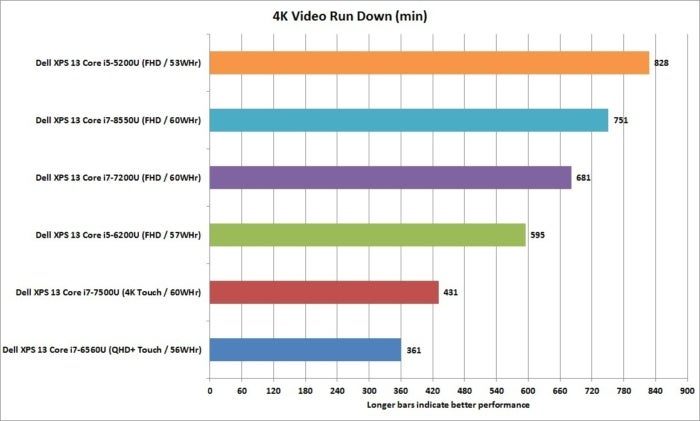 IDG
IDGThe 8th gen-based XPS 13 does relatively well in our 4K video rundown test.
The 8th-gen can be faster on lighter loads
We’ve been playing with Cinebench’s ability to vary the thread load to try to simulate just what kind of performance you get as you slide the load on the CPU from one to eight threads.
Running Cinebench on the laptops, we can see the latest 8th-gen Core i7 surprisingly has a performance advantage on very light workloads. At the far right side of the chart though, the 15-watt chip can’t keep up with the 45-watt chips, falling into third place.
The good news is fourth place is not even in this race. This is a good show for the 8th-gen quad-core Core i7.
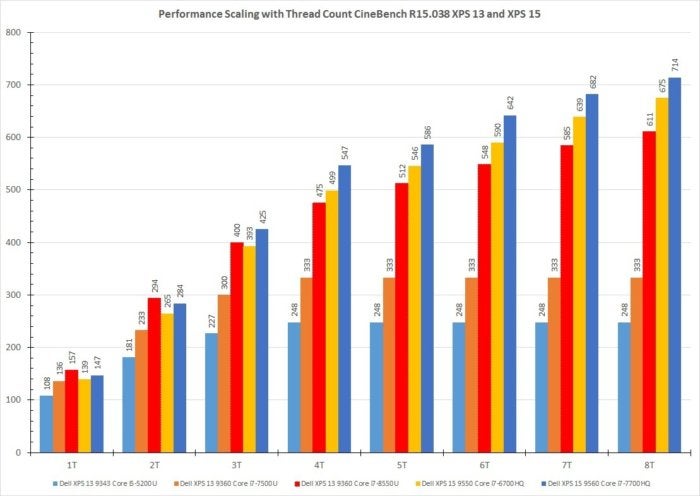 IDG
IDGRunning Cinebench, the 8th-gen Core CPU excels at light loads.
The 8th-gen Core i7-8550U’s biggest advantage lies in clock speeds. Remember, it has a turbo boost rating of 4GHz vs. the 3.8GHz of the Core i7-7700HQ and the 3.5GHz of the Core i7-6700HQ.
To see how the clock speeds react under loads, we again looked what the various laptops hit 10 seconds into a Cinebench R15 run. You can see just how much of a clock speed advantage the 8th-gen Core i7-8550U holds over all others on those light loads just a few seconds into a test. Note: In the chart below, we’ve focused on clock speeds from 2GHz to 4GHz to make it easier to read.
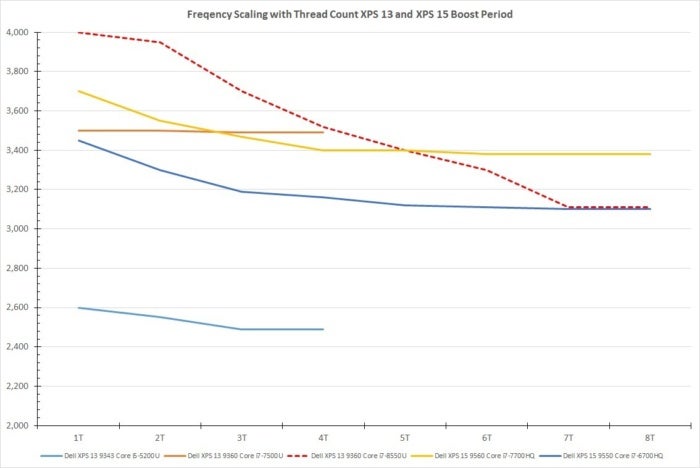 IDG
IDGIn another look at the data, the 8th-gen CPU hums along on light loads, at least at first.
But the thing is, once you warm that tiny XPS 13, it’s not going to sit at those ultra-high clock speeds for that long. So we decided to record the clock speed the various XPS models would hold for the entire benchmark run.
As you can see, on a single-threaded workload, the 8th-gen Core i7-8550U has no problems running at 4GHz. Once we move it to two threads and then three threads, the chip burns through its very high burst mode faster than a nerd eats Doritos.
In fact, the quad-core 8th-gen Core i7-8550U pretty much matches the dual-core 7th-gen Core i7-7500U on two and three threads and then falls below it on four threads. It also falls below Kaby Lake and Skylake quad-core CPUs.
So yes, a 45-watt TDP with better cooling is going to be faster than a 15-watt one in a smaller, thinner laptop.
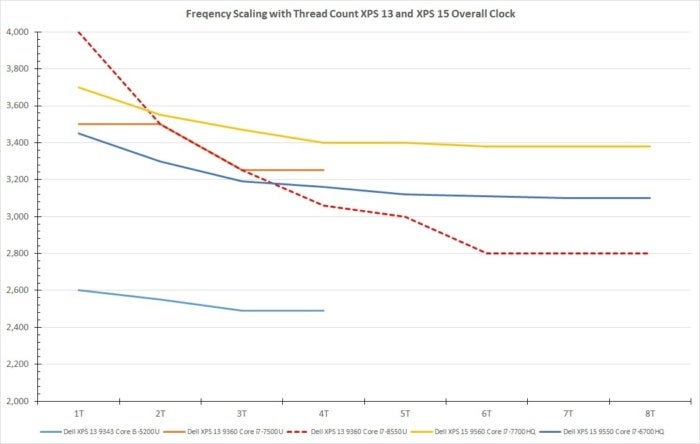 IDG
IDGAs the test progresses and we add more threads, the 8th-gen CPU’s clock speed drops precipitously.
What about Ryzen 7 mobile vs 8th gen Core i7?
There is one question left outstanding, and that’s AMD’s recent announcement of its Ryzen 5 and Ryzen 7 mobile CPUs. AMD says Vega goodness plus Zen goodness will equal a new mobile CPU to give 8th-gen laptops a serious run for the money while using similar or less power. We haven’t seen these new Ryzen 5 and Ryzen 7 laptops up close yet, though, so until the company can prove it, and prove it in laptops people might want to buy, we’ll have to wait and see. 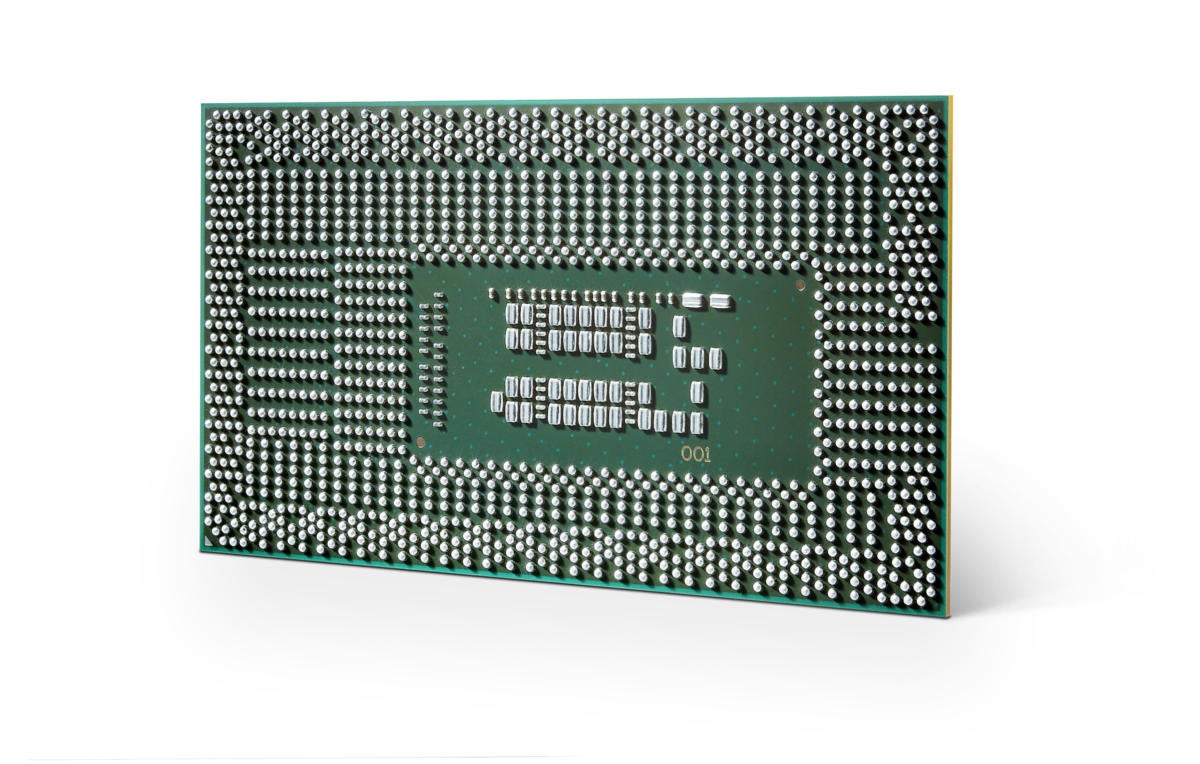
Intel
Intel’s 8th-generation Core i5 and Core i7 is a quantum leap in Ultrabook performance.
Conclusion
There’s only one way to describe our experience with the Core i7-8550U inside the Dell XPS 13: Impressed. No wait, damned impressed would be a better way to couch it. For years Intel’s CPUs in Ultrabooks have improved mostly incrementally, from 4th-gen Haswell to 5th-gen Broadwell, to 6th-gen Skylake. Sure, 7th-gen Kaby Lake represented a healthy bump over Broadwell, but not like this.
The 8th-gen Kaby Lake refresh, as it’s called, is a quantum leap forward for ultra-portable laptops. You’ve simply never been able to get this kind of performance from something so small before. Yes, it’s that good.
Remember that this is just one example. Unlike desktops, where the variance from CPU to CPU is minuscule, laptop cooling designs and decisions on fan noise and thermals will likely have a huge impact on the new 8th-gen CPU’s performance.
But in this Dell XPS 13, the 8th gen Core i7 simply rocks. Here’s our full review of the XPS 13 with the 8th gen Core i7 in it but you already know the important details.